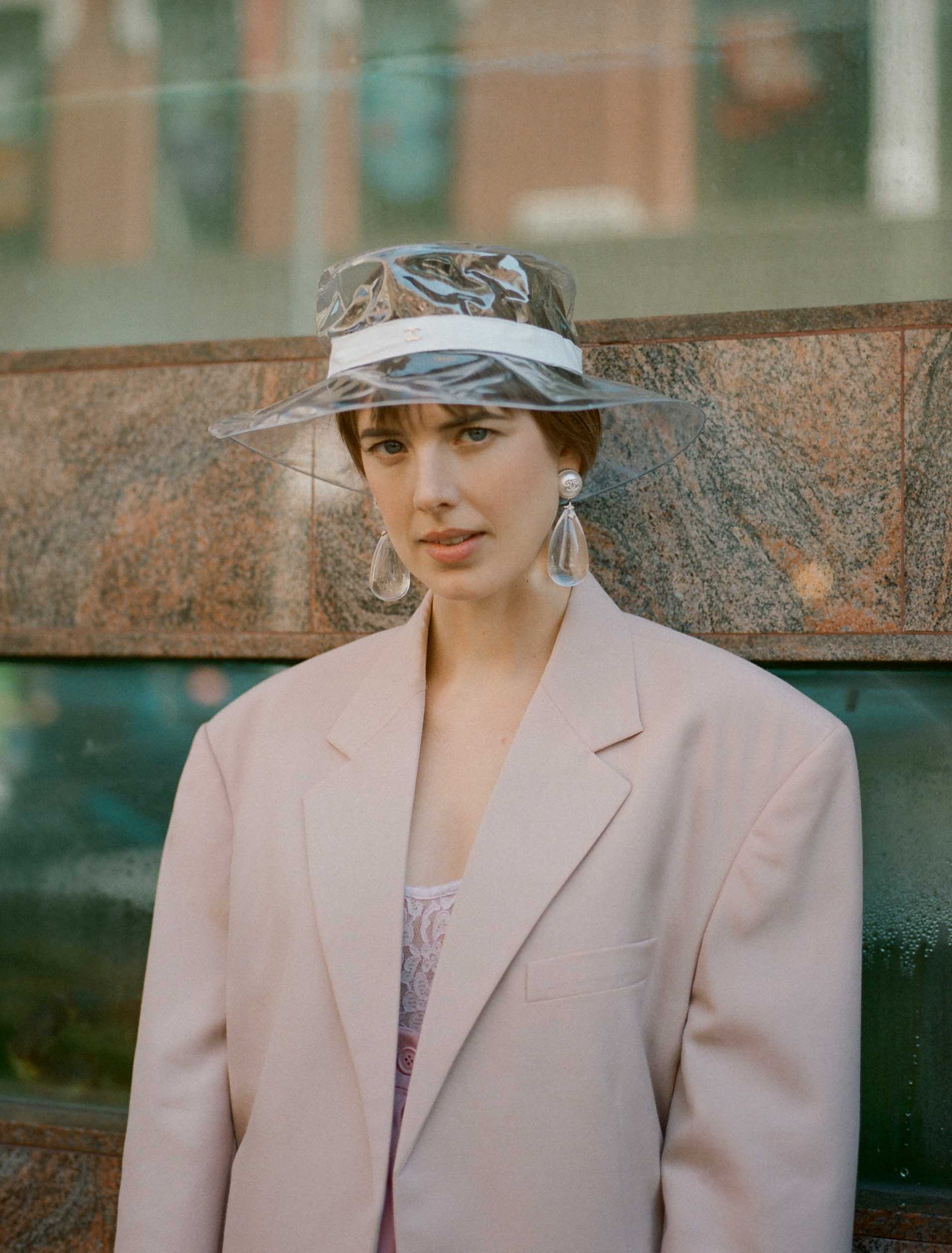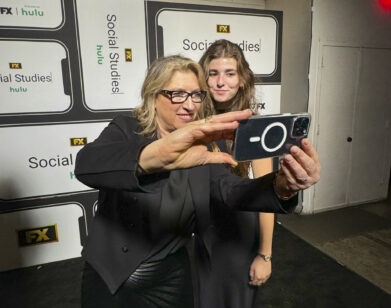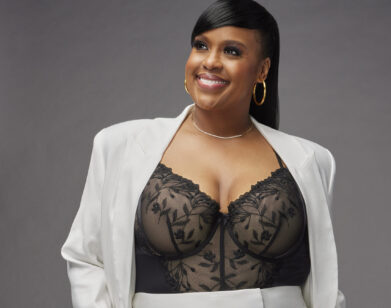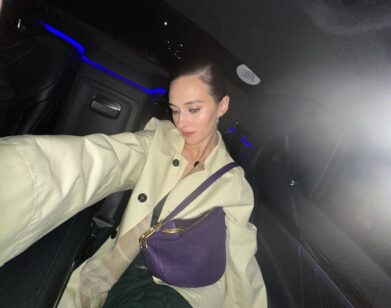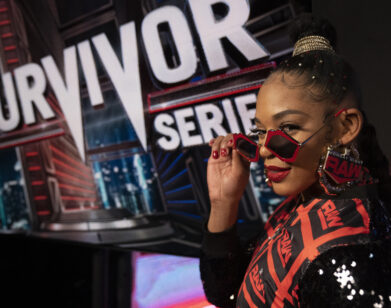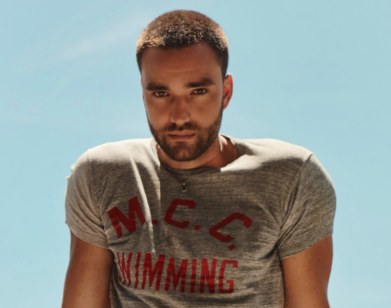How Agyness Deyn is taking on the apocalypse
AGYNESS DEYN AT HOTEL 50 BOWERY IN NEW YORK, MARCH 2018.
When, around 2011, the target of model scouts everywhere switched to the visually genderless (yet no less symmetrical) under-21 faces of the world, it’s easy to imagine Agyness Deyn feeling a pang of frustration. The former model’s aesthetic, which landed on the more masculine side of the spectrum—and which was endlessly celebrated during her modeling heyday in the early 2000s—had suddenly become a money-making, commodified trend referred to as “androgyny,” and one that barely gave credit to this pixie-haired punk Brit who was among the first to champion this look.
After speaking with Deyn about her new Hulu series Hard Sun, it seems more likely that this frustration belongs solely to me. For her, fashion is no longer, as she told me, “the most important thing.” Rather, it’s taken a back seat to her acting career—and with good reason. Around 2010, after trying her manicured hand at acting, Deyn knew she had found her true vocation. Transitioning into acting was less a choice as it was a necessary pursuit. “I decided that I had to act because it made me feel so exhilarated and challenged,” she said. “I just love the creativity of it and the people that I’ve worked with.” Like anyone switching careers, she knew it would require hard work, but after years of study under various renowned directors, making the occasional cameo, and playing, every so often, the supporting role, she has now secured one of the leading roles in Hard Sun.
Taking place in a world in which the apocalypse is imminent—five years, to be more precise—Hard Sun follows two private detectives, DI Elaine Renko (played by Deyn) and DCI Charlie Hicks (played by Jim Sturgess), who are struggling to right wrongs and seek justice in what is an increasingly chaotic, tumultuous, and lawless world. And time is running out…
RACHEL HODIN: I know Hard Sun has an apocalyptic type theme to it. What is it about apocalyptic stories that appeals to you?
AGYNESS DEYN: The thing about it is: if the world is going to end, you forget about the mundane [aspects of] life—like that you forgot to pay your electricity bill, or that you had an argument with your brother. So all of the day-to-day worries that we have—deadlines, all this kind of stuff—gets taken away. Which is why I think we all love apocalyptic themes; it takes away all of that everyday nuisance, I suppose.
HODIN: Have you ever thought about what you would do if there were a zombie apocalypse?
DEYN: A zombie apocalypse is definitely a fun thing to think about—though I don’t think I’ve ever thought about it. [laughs] But when you’re filming a show like [Hard Sun], you can’t help but wonder what you would do in such a situation because you’re trying to wonder what your character would do. Rather than spending all my money, I think I would want to go to the countryside and just chill—find somewhere that wasn’t affected by the chaos of everything and just live out there with my friends and family and come to peace with the end. I think? I think that’s what I would do.
HODIN: Yeah, I definitely would not be proactive in a zombie apocalypse. How did you prepare for the fight scenes in Hard Sun? Did you have a body double?
DEYN: No, they couldn’t find a female stunt double that would cut their hair short, so the stunt coordinator said to me, “Okay, so what we’re going to do is teach you everything and then when we come to it, you can decide what you want to do and don’t want to do.” By the time I was coached and had been taught how to do all the stunts safely and how to do all the fights, I felt obliged to do everything. There were a few things, legally, that I couldn’t do—two things in the whole series. But everything else I did. Which was crazy. I don’t think I would have done anything if I hadn’t felt safe, but there is an adrenaline rush to actually be able to fully be the character in every situation.
Before we started all the stunt training, I did Krav Maga, Korean knife-fighting, and boxing, and I used to fight competitively in karate when I was a kid, so I definitely had a martial arts background that I could draw upon. And then whenever we had a little downtime, the stunt team and I would just rehearse and rehearse and rehearse. I called it our “dark ballet classes.” [Laughs] It’s funny because I actually met Jim [Sturgess] for the first time in the read-through, and then literally a half hour later we were rolling around on mats, me biting his arm and stuff—it was a funny introduction.
HODIN: Do you find that you’re more drawn to British or American television?
DEYN: Both, really. There’s just such good television on [right now]. Being English, I love English TV. I actually have a U.K. TV box—it’s called U.K. TV Everywhere, and I have it at home [in New York] so I can watch English telly. I watch English TV more than I watch American TV, but then there are such brilliant shows like Breaking Bad [and] Homeland, which I love.
They’re just so different, you can’t really tear them apart. Let’s just say they can be very good friends, but they’re not the same—they’re not identical twins.
HODIN: Are you watching anything at the moment?
DEYN: I’m catching up on the new season of Homeland that’s just out. I’ve been watching this weird TV show that I’ve never seen before on A&E called Intervention. Which is so intense and so exhausting to watch. I like to have the balance of full-on, exciting shows that you have to really pay attention to and shows that just don’t require me to think when watching them—English shows like First Dates and stuff like that.
HODIN: Is there a director that you’ve always dreamed of working with?
DEYN: Wong Kar-wai. I watched In The Mood For Love [2000] a few years after it came out and just fell in love so much with that film; I would love to work within his aesthetic. And then a dream since I was a little girl is working with Steven Spielberg; I mean, I think every person would want to work with him. Watching his documentary made me love him even more. I was like, “Oh my God, I have to work with this guy!” But yeah, big dreams.
HODIN: Did you find that it was hard to cross over from modeling into acting?
DEYN: When I started acting, I wasn’t really thinking, “Okay, now I have to cross over from modeling to acting,” so it wasn’t as if I was really conscious of it being a hard transition. The difficult thing was starting from scratch. Like with any new thing that you learn, it was hard; it’s so exciting that you want to learn it faster and you want to reap the rewards faster. But I don’t think I was really conscious of the transition because as soon as I made the decision—for me, this was what I was gonna do.
HODIN: Does fashion interest you at all anymore? Do you still keep up with what’s going on in the industry?
DEYN: I don’t actually. I love the expression that you can have with clothes. But in some ways, I wear a uniform nowadays: men’s trousers, a t-shirt, a hoodie. It’s a uniform that, in some ways, lends to the fact of not keeping up with fashion. And also, take Hard Sun: I was working for six months, six days a week, for 16-hour days some days; being a different character means being in their clothes and putting yourself on hold a little bit. I love to dress up for premieres and screenings and stuff like that. When you’re in the industry, you just kind of live and breathe it, but I supposed it’s not the most important thing anymore.
HODIN: Is there anything exciting you’re currently working on?
DEYN: I’m doing a film; we start in a few weeks in New York, and it’s about musicians and the wonderful world of that industry.
HARD SUN IS NOW AVAILABLE TO STREAM ON HULU.

